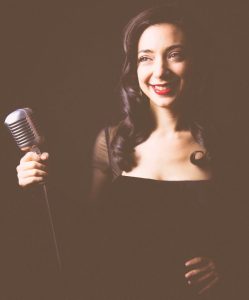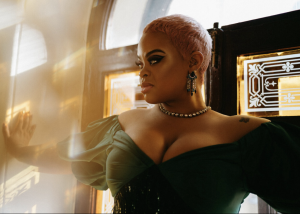Bistro Bits: Summertime Serenaders, Part 2 – Julie Benko and Laurin Talese
No matter where singers are in their career trajectory, the potential for creating something magical is a constant. Veteran performers are obviously more qualified to look back at how they’ve gotten to where they are, while newbies tend to look with yearning toward what’s ahead on the path. But there’s no reason for singers to feel they must be frozen, in terms of the repertoire they choose or the approach they take when performing it.
Last week, Bistro Bits put the spotlight on two singers (Jane Scheckter and Marieann Meringolo) who’ve been entertaining cabaret audiences reliably for several years.
This week, we mix it up with a pair of singers–one from the theatre, one from the jazz world—who are not exactly newbies but who have come into their own in recent years and have “big time” written all over them. Let’s hope those words are written in indelible ink.
Julie Benko: Pre-Partum Jubilation
Who doesn’t relish the story of a human butterfly emerging from the chrysalis and dazzling the world? Especially when that butterfly is as talented and engaging (and, yet, as seemingly down to earth) as Julie Benko.
Hired as a standby for the role of Fanny Brice in the first-ever Broadway revival of Funny Girl in 2022, Benko would fill in for star Beanie Feldstein during Feldstein’s abbreviated time with the show. She was then an alternate as Fanny after Lea Michele replaced Feldstein. Later, after Funny Girl closed, Benko played a major role in Broadway’s Harmony, created by Barry Manilow and Bruce Sussman.
In addition to her legit-stage work, Benko has also pursued work as a club singer, earning additional acclaim. I missed her cleverly titled Standby, Me cabaret show, but was lucky enough to see a brand-new show at Birdland recently: an untitled evening dealing with her first pregnancy (she will give birth later this year). Benko’s husband, Jason Yeager, was on hand as her music director and pianist–and also as a comedic partner, cracking wise with ad libs and groaner gags. (Benko’s show may deal with her adjustments to impending motherhood, but Yeager seems already to have the “dad joke” thing down to a science.)
The evening took off with an opening number that could hardly be called rousing, although it was–arguably–perfect for the evening’s theme: a sprightly, quirky, uptempo jazz arrangement of Peter Pan’s “Never Never Land” (Jule Styne, Adolph Green, Betty Comden). Benko remarked that her unborn child can now supposedly hear human voices. If that’s so, I’m certain baby felt safe and soothed by this gentle, playful opener. Benko’s singing voice can be adamant, yet it retains a sweet and gentle quality. Were I a fetus seeking someone for the role of Lullaby Singer, I’d be beyond thrilled if Julie Benko showed up at the audition.
This show had a mere 13 songs, but it nonetheless seemed like a full, rich evening. A variety of song genres were featured. On some numbers, the stellar corps of musicians–Yeager, Justin Poindexter (guitar), Gabe Terraciano (violin), Michael O’Brien (bass), and Paul Francis (drums)–provided something of a country-ish sound (as on Brandi Carlile’s “Mother”) or–even better–a western swing vibe (an invigorating take on Maltby and Shire’s “What Could Be Better?” from Baby), sung as a duet with guest singer Jeremiah James, who’d played opposite her as Nick Arnstein in Funny Girl).
Introducing the Kern-Hammerstein classic “Can’t Help Lovin’ That Man,” Benko spoke about expectant mothers whose stories she’d encountered on a “What to Expect” pregnancy app–some of whom seemed to be facing sad and frightening futures. With them in mind, she performed “Can’t Help Lovin’…” In the song’s last moments, she wailed with heartbreaking openness.
Two of my favorite songs in the show were Benko’s versions of Laura Nyro’s “Save the Country” and Terry Gilkyson’s “The Bare Necessities” (from Disney’s Jungle Book film). Introducing “Save the Country” she turned briefly political, speaking of the upcoming election and advocating for progressive causes. The number itself had a fascinating arrangement: repeatedly changing tempos and moods, playing up the wild and compelling idiosyncrasies of Nyro’s musicality. “The Bare Necessities” was good swinging fun: exuberantly sung, accentuated at one point with a measure or two of festive salsa beats.
Much of the patter toward the end of the show was about Benko’s need to find the right balance between her role as mother and her emergence as a theatre (and cabaret) star. Benko seems resourceful and wise beyond her years, and I am certain that she, with jokey dad Yeager beside her, will be able to strike that balance with poise and good humor.
Meanwhile, I’m happy and grateful, for this blessed event at Birdland…before the actual blessed event. (Attended August 12.)
Laurin Talese: Breaking Through the Sass Ceiling
Back in 2018, Laurin Talese was named the winner of the 7th Annual Sarah Vaughan International Jazz Vocal Competition (sometimes referred to as the “Sassy Award”). Originally from Cleveland, Talese studied classical (and jazz) voice at Philadelphia’s University of the Arts.
I had not seen her perform live before her recent Manhattan show, uptown at the Smoke Jazz and Supper Club in the Bloomingdale neighborhood. I caught her second set of the evening and was (eventually) favorably impressed with her performance.
The set began with a lively opening instrumental number from Talese’s musicians: Mike King, (piano), Anwar Marshall (percussion), John Ellis (saxophone/flute), and Vicente Archer (bass). Talese then stepped onto the stage, wearing a strikingly glamorous dress with a pattern of large, water-color-like blossoms: hollyhocks or hibiscus, maybe).
Her first number was the only one in the set that might be called a standard: “Night Song” (Lee Adams, Charles Strouse), from the musical Golden Boy–a number introduced on Broadway by Sammy Davis, Jr. and subsequently associated with sassy Sarah Vaughan herself. Talese’s velvety yet vibrant vocals and precise diction served her well here. She treated “Night Song” with a hushed gingerliness that seemed to suggest caution: perfect for lyrics sung by a stranger encountering a bustling urban neighborhood at twilight, when the night sounds made by contented people only enhance the feeling of isolation and loneliness.
The selection of follow-up songs seemed somewhat odd to me. The next two turns–“Don’t Walk Away” (Vassal Benford III and Ronald Spearman) and “Love Poems” (written by Talese)– were, like her opening number, rather slow and dreamy. A sameness seemed to be creeping into the set, although “Love Poems” built slowly in fervor, a bit like Ravel’s “Bolero.” (This song was also given some life thanks to a flashy sax solo by Ellis.)
Throughout her first 20 minutes or so, Talese often sang with her eyes either shut tight or somewhat downcast. I got the feeling that she might be one of those jazz singers who sees herself as simply one of the musicians: deeply concentrated, her voice merely another sonic layer–another texture in the overall soundscape.
But in the remaining part of the evening, she put herself more clearly front and center. She had more eye contact with the audience, and she presented herself as more of a singer-actor, an interpreter of lyrics. On another song of her own creation, “Made Up My Mind” (about a romantic breakup), she sang the lyric “We can still be friends, there’s no hard feelings” and made the subtext clear: Yeah, there definitely ARE some hard feelings.
And, at last, she was giving us some up-tempo numbers! She bit right into “Flor de Lis” (Djavan), which she sang trippingly in Portuguese. And her take on Robin Thicke and Sean Hurley’s “Lost Without U” was playful and–yes!–sassy.
Talese saved the best for last, a rousing, bluesy original number called “Soothsayers.” Here, she not only looked like a star singer, she also performed like one.
Maybe the imbalance between the laid-back opening and the energetic conclusion was just a matter of song selection for this particular set. In any case, I was happy to see her emerge from her shell. For me, Talese’s Smoke show was a welcome introduction to an intriguing and clearly gifted singer. (Attended August 14.)
###
About the Author
Mark Dundas Wood is an arts/entertainment journalist and dramaturg. He began writing reviews for BistroAwards.com in 2011. More recently he has contributed "Cabaret Setlist" articles about cabaret repertoire. Other reviews and articles have appeared in theaterscene.net and clydefitchreport.com, as well as in American Theatre and Back Stage. As a dramaturg, he has worked with New Professional Theatre and the New York Musical Theatre Festival. He is currently literary manager for Broad Horizons Theatre Company.






